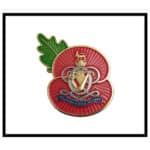Mesopotamia
In August 1914 the 7th Hussars were stationed at Bangalore (Karnataka, India) having arrived there on 4 November 1911. The Regiment landed in India from England on 2 November 1911.
By 1916, the Regiment was serving as part of the 4th (Meerut) Cavalry Brigade. On 4 October 1917, the 7th Hussars received orders to mobilise for service in Mesopotamia and moved to Karachi (Sindh, Pakistan) on 18 November 1917.
The Regiment left India in three ships, all of which safely arrived at Basra, Mesopotamia (Iraq) the same month. On arrival, they joined the 11th Indian Cavalry Brigade which it served until December 1918 when they joined the 3rd Indian Cavalry Brigade.
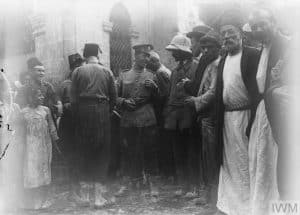
A scene in a bazaar in Aleppo, October 1918. Copyright: © IWM. (Q 12454)
They stayed in Magil until December 6th and were busy during that period getting the men and horses fit and generally preparing for the march to Baghdad.
During the march up the Tigris, the weather was generally very cold and after leaving Shaikh Saad on the 19th, heavy rains impeded their progress.
On January 24th, they were met in Baghdad by the General Officer Commanding the 11th Cavalry Brigade and his staff. Then on March 4th, the 7th Hussars moved to Iron Bridge.
The 7th Hussars was now about to take part in offensives against the Turks, whose main forces in Mesopotamia were lying principally in the valleys of the two great rivers of that region, the Euphrates and the Tigris.
Khan Baghdadi
Their first action against the Turks was at Khan Baghdadi on 25 March 1918 when the regiment outflanked and then helped dislodge the enemy from a strong defensive position.
Sharqat
The 7th Hussars were in action again on 28 October 1918 in the last clash with the Turks at Sharquat two days before they surrendered. Two squadrons dismounted and charged the enemy in a strongly entrenched position with such tenacity that they were forced to flee.
Battle Honours
The 7th Queen’s Own Hussars were awarded 3 battle honours during this period.
Why not discover the action behind each one:
The Great War 1914-18 Medals
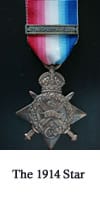
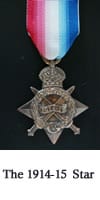
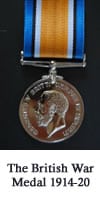
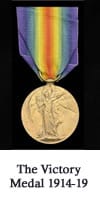
The 1914 Star was awarded to personnel who served in France and Belgium between 5 August and 22 November 1914.
1914-15 Star
The 1914-15 Star was awarded to personnel who saw service in any theatre of war between 5 August 1914 and 31 December 1915, other than those who had already qualified for the 1914 Star.
British War Medal 1914-20
The British War Medal 1914-20 was awarded to personnel in recognition of the successful conclusion of World War 1. It was later extended until 1920 to cover mine-clearing services and operations in North and South Russia, the eastern Baltic, Siberia, the Black Sea and Caspian.
The Victory Medal 1914-19 was awarded to all personnel who received the 1914 or the 1914-15 Stars. It is often referred to as the Allied War Medal.


